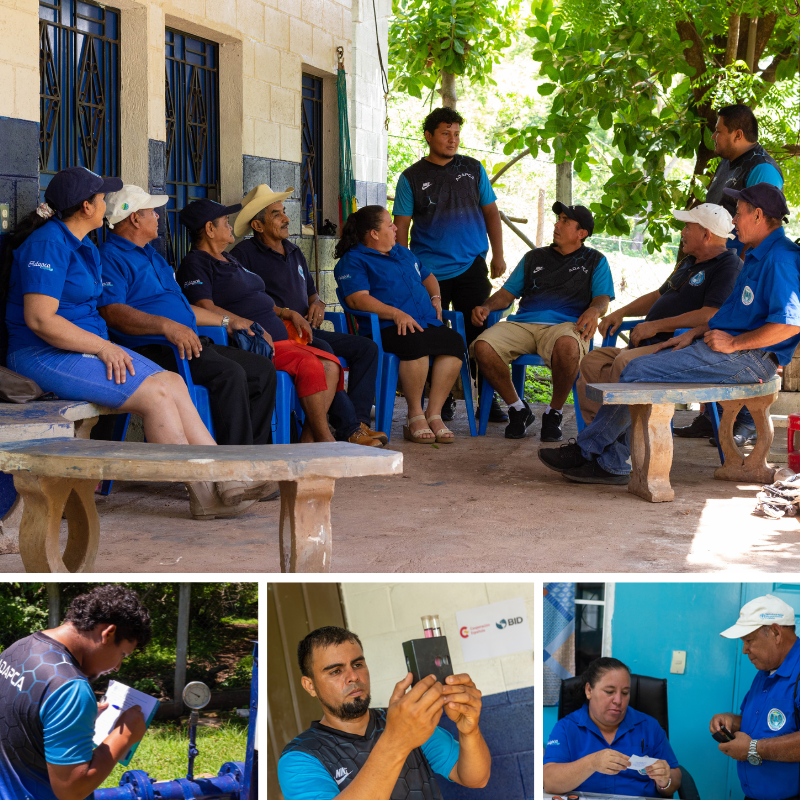“If man is a gesture, water is history. If man is a dream, water is direction. If man is a village, water is the world,” says Joan Manuel Serrat in “Man and Water.” And it’s true that water changes our reality and how we perceive it. This became evident in rural communities in El Salvador after a project allowed them to have safe access to water and sanitation for the first time
By Andrea Ortega C.
More than 2 billion people in the world lack safe access to water and sanitation, impacting various aspects such as hygiene and health, according to the Joint Monitoring Programme for Water Supply, Sanitation, and Hygiene.
This was the case for Sonia Ruiz, a resident of the community of Apastepeque, located in San Vicente, 60 kilometers from the capital of El Salvador. “Most of my siblings were always sick because of the water. We used to drink water from the spring (of the river). I am the oldest and I was the most severely affected,” she recalls, reflecting on the consequences of drinking water from a contaminated source at a time when safe access to water resources was not possible.
For this community, the lack of access to water and sanitation conditioned their lives. Economically, for example, the lack of water supply jeopardized agricultural production, the main source of income in the area. “It was sad because if one didn’t have money and didn’t have water…,” says Elena Menjívar, who also lives in Apastepeque.
Furthermore, it affected the schedules and habits of people, particularly women, who are mostly responsible for obtaining water for their families. “We had to wake up early because we lined up to get water. We filled three barrels to take on the cart with the oxen,” says Verónica Machado, from the community of Concepción de Batres, Usulután, located 125 kilometers from San Salvador.
Water: A Community Project
For this reason, the Inter-American Development Bank (IDB) together with the Spanish Agency for International Development Cooperation (AECID) carried out a project that allowed communities like Apastepeque, as well as other rural and peri-urban communities in the country, to have safe access to water and sanitation for the first time. “The Spanish cooperation has impacted in three areas: improving and expanding water services in rural and peri-urban areas, strengthening basic sanitation systems, and enhancing governance and management of water resources in the country,” explains Fernando Rey Yébenes, general coordinator of Spanish Cooperation in El Salvador.
The challenge was significant, as communities like Apastepeque had never had access to these services before. For this reason, both the municipality and the implementers carried out a process that involved the entire community. “Having people in charge of its administration, care, and maintenance is one of the keys to success,” comments William Semerón, responsible for community organization in the municipality of Concepción Batres.

Thus, the project also helped improve El Salvador’s water ecosystem. “The project contributed to strengthening coordination among different institutions linked to the rural water and sanitation sector and implemented concrete actions associated with the sustainability of the works,” explains Margarita Libby, IDB Chief of Operations in El Salvador.
Safe Access: Water for Well-being
The IDB and AECID project’s main goal was to improve communities’ living conditions, from their daily habits to their work. For Elena, this means saving time on household chores. “Now that we have water, we no longer go to the tap to wash. We don’t have to go to the river to wash,” she says.
For Verónica Machado, her greatest joy is the security this provides for her children, who no longer risk their health. “The kids bathe all the time. They come, change, I give them lunch, and they wash their hands. Their hands are never dirty for long,” she says.
And for Sonia, this even allowed her to increase her income. “When we had water, they gave us 20 trees. We take care of them, water them, and I sell 100 (mangos) for 20 dollars,” she happily explains about the opportunities that having water on her property has provided her.

The project allowed rural communities that had never had water and sanitation in their homes to access these services for the first time. “This has been an extremely valuable project that, if it weren’t for the IDB and Spanish Cooperation, would not have been a reality… The assistance received was vital so that today around a thousand families from about 17 communities in our municipality have this service,” explains William.
“I am very grateful to the IDB and Spanish Cooperation for thinking of us, for considering us, and for making it possible for us to have water in our homes,” adds Sonia, who no longer fears safely drinking water at her home.
This article is part of the series “Changing the World Through Water and Sanitation,” a collaboration between the Inter-American Development Bank (IDB) and the Spanish Agency for International Development Cooperation (AECID) highlighting the impact that water and sanitation projects have on people in Latin America and the Caribbean.
Guest Author
Andrea Ortega Carreño is a Communications Consultant for the Inter-American Development Bank (IDB) and Spanish Cooperation, and supports the Spanish Cooperation Fund for Water and Sanitation in Latin America and the Caribbean (FECASALC). She is a doctoral candidate in feminist and gender studies at the Complutense University of Madrid.


Leave a Reply